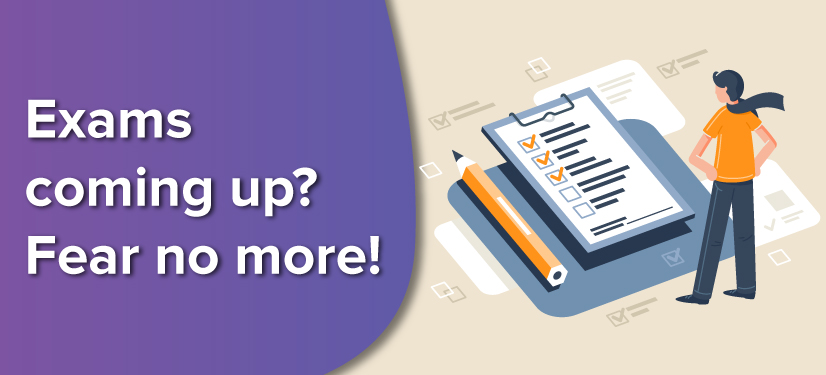Do this and never fear exams ever again

Anxiety and fear are not good for grades. learning how to overcome exam fear is essential in topping your exams. The very thought of covering a vast amount of coursework before you set foot in the examination hall could make anyone nervous. A little anxiety is normal and you need not worry about it too much. On the other hand, excessive stress and pressure on your mind could have detrimental effects on your health and overall performance.
We have compiled a list of practices that can help you sail through your exam like a breeze. Let’s look at what you can do to kill anxiety and fear of exams:
- Keep realistic targets
You need to be fair even while setting targets for yourself. Do not set unrealistic targets as it can have a very negative effect on your composure especially in the exam hall. Plan well, keep reasonably achievable targets and, plan and prepare well in advance to make sure you don’t face any stress. - Follow what works for you
Different students are productive at different times of the day. You are more likely to be productive in the morning hours rather than later. If that’s the time you can get a laser-like focus then that’s when you should study the hardest. And you need to set your timetable accordingly, allowing you to learn during those productive hours. Less important things can be done during the less productive hours of your day. - Short notes and points
Try to make short notes of different topics as you cover your portions. They need to be crisp and easy to go through. These notes will come in handy during the revision phase. You can practice active recall from memory and use your short notes or flashcards for a sneak peak when you get stuck. You could make it visually appealing by using markers to highlight headings and subheadings, diagrams and whatever you find the most useful. - Practicing with mock question papers
Giving yourself a simulated taste of the examination is a great way to curb your anxiety. While you practice previous years’ question papers, remember to time yourself. Doing this results in better time management for students in the exam hall. While doing this give priority for answering questions you know well. Answering questions will help you build confidence and can help you analyse and identify question patterns and predict question types as well. - Seeking help!
Doubts are an integral part of the learning process. But getting them cleared on time is vital to achieving good marks in your tests. In order to get your doubts cleared you may approach your study buddy, your teacher or even your parents for that matter. Remember not to keep anything for later. You will have to get them cleared as you get them. This way you will remain confident and stress free throughout your preparations. - You deserve a break!
When setting your timetable make sure to give yourself some time for a break in between your study routine. Breaks help you increase your concentration and are a part of a healthy and balanced study life. Outdoor games or simply taking a stroll outside can help you relax a bit as well.
Here are two other aspects you need to focus on while preparing for exams. –
Failure is the stepping stone to success!
Humans learn from their failures and setbacks. It’s ok to get things wrong, so don’t be disheartened. The important thing is to learn from your mistakes and to never give up until you win. Not only will this attitude help you in your exams but also later in various occasions in your life. Your ability to learn from mistakes will make you a lifelong learner and will help you build the confidence you need to overcome any challenges.
Focus on ‘Conceptual Understanding’ rather than rote memorisation:
Every time you attempt to understand something conceptually you end up with the ability to reproduce it successfully. This is because conceptual learning is a much better learning process as opposed to rote memorisation, where you end up learning your subjects by heart without having any clarity.
By using visual learning materials students can clearly grasp concepts within a short span of time. Visual learning not only reduces the time needed to learn but also helps in better memory retention and faster execution in an examination hall. Ideas and theories that come to life via videos and images will help amplify memory retention and eventually reduce the time needed to learn as opposed to just reading text.
Striving towards conceptual understanding of any subject is the best long-term strategy to pursue. Exams and your marks are important but what is more important is your understanding of the subject, how you take part in engaging and stimulating discussions, and how you seek advice and direction from your mentors to make learning more fun and interesting. At the end of the day it’s all about giving it your best. So relax and prepare for your exams systematically and say goodbye to anxiety!
All the best!